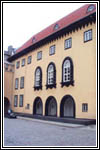 |
Vol 0, No 39
21 June 1999 |
|
|
 T H E A M B E R C O A S T:
T H E A M B E R C O A S T:
Latvia's Outgoing President Mel Huang The presidential election in Latvia on 17 June ended one of the most significant chapters in the nation's history. As much as it marked the start of a new presidential career, it also marked the end of the two terms held by Guntis Ulmanis. Most Latvians have never known another President, because Ulmanis has held the position since its restoration in 1993. As much as Ulmanis set a major precedent in his role as President for six years, his successor will equally affect Latvia in how she holds up to the high examples Ulmanis set. Writing the Guntis Ulmanis chapterDuring the two terms of Guntis Ulmanis's presidency, Latvia transformed itself from a country under foreign occupation to a thriving and successful reformer. He oversaw the withdrawal of Russian forces in 1994, countless government crises, scandals, triumphs and controversies concerning Latvia on the international stage, and the gradual integration of Latvia into European structures. Few could imagine, when Ulmanis first took his oath of office, how quickly Latvia would develop. Detractors even predicted Latvian independence would not survive these early years. That is not to say Ulmanis himself has not been controversial. Some question his background and relationship with the Communist Party during the occupation, while others accuse him of a natural bias towards the centre-right (Ulmanis was a member of the Latvian Farmers' Union, a centre-right coalition partner at the time of his election). Some criticised for his apparent flip-flop over the decision to make 16 March "Soldiers' Day," but others commended his admission of an error of judgement. Many remember Ulmanis for one of his most controversial moves -his handling of the mess after the 1995 Saeima (Parliament) elections. His decisions ruffled many feathers and demonstrated his political leanings had not subsided despite bring officially "apolitical." Those elections produced a hung Parliament, with two distinct blocs appearing, with each holding nearly half of the chamber's votes. Ulmanis, following his centre-right leanings, called on Maris Grinblats of the right-wing For Fatherland and Freedom to form the government instead of Ziedonis Cevers, whose Democratic Party "Master" won the plurality of votes. Cevers and others from the centre-left criticised Ulmanis for "breaching a European norm." As expected, Grinblats failed to win a confidence vote. The mantle then passed to Cevers, who also lost a confidence motion by one vote. Finally, Ulmanis chose apolitical businessman Andris Skele to lead a rainbow coalition. Despite the messy combination and frequent infighting, the Skele government accomplished many important tasks. Many claim that Ulmanis exceeded the spirit of the presidency's powers, but he can be seen to have established the president's office as an effective and active player on the political scene. Ironically, after the 1998 Saeima elections, Ulmanis went again against the "European norm" and bypassed the winner of the plurality of seats, the People's Party of the same Andris Skele. The end of the Ulmanis legacyWith the exit of Ulmanis comes the end - at least for now - of the legacy of the Ulmanis name in Latvia. Many attributed Guntis Ulmanis's victory in 1993 with his surname - which he shared with his great uncle and former Latvian President Karlis Ulmanis. The family link at the time reinforced the "continuity" of the Republic of Latvia from before the occupation. Despite his authoritarian tendencies in the 1930s, Karlis Ulmanis represented free Latvia for most Latvians, and his deportation by the occupying Soviets (along with tens of thousands of others) from Latvia in 1940 still haunts the nation. The death of Ulmanis in a Soviet camp and the failure to locate his remains leaves this sad chapter of Latvian history open. However, the retirement of Guntis Ulmanis in early July 1999 will be a highly symbolic moment and bring about a psychological change for the nation. Barred by term limits from running for a third consecutive term as President, Ulmanis is currently weighing his options for the future - though he seems to rule out running for the presidency again. Like his term in office, his post-presidential career will be precedent-setting. In many ways, Ulmanis will remain in the spotlight in Latvia despite retirement. Hard shoes to fill It is difficult to say that the now six presidents of Latvia built upon the same office. After the long gap during the Soviet occupation from 1940 to 1991 (excluding 1941-44, when Latvia fell under Nazi occupation), the foundations of the office established by the four presidents of the Interwar years needed to be re-established. Latvia's first president, Janis Cakste (1922-27), established the prestige of the office for his successor, Gustavs Zemgals (1927-30). However, the inactivity of the third president, Alberts Kviesis (1930-36), in reacting to the authoritarian rule of then-Prime Minister Karlis Ulmanis in 1934 remains a question. Finally, Ulmanis took up the presidential role himself in 1936, until the Soviet occupation started in 1940. The office was restored in 1993, two years after the restoration of Latvia's independence. As Latvia moves beyond the Guntis Ulmanis years, his successor will need to prove that the presidency is a living, vital office. As in the case of John Adams in the United States, the second presidency is nearly as important as the first, especially if the first held the position for a long period. Most would wish the new Latvian President to find more success than Adams, and Latvia cannot necessarily count on finding a Thomas Jefferson next time around. Mel Huang, 17 June 1999 Related Links: The Office of President Guntis
Ulmanis
|
|
![]()
Copyright (c) 1999 - Central Europe Review and Internet servis, a.s.
All Rights Reserved